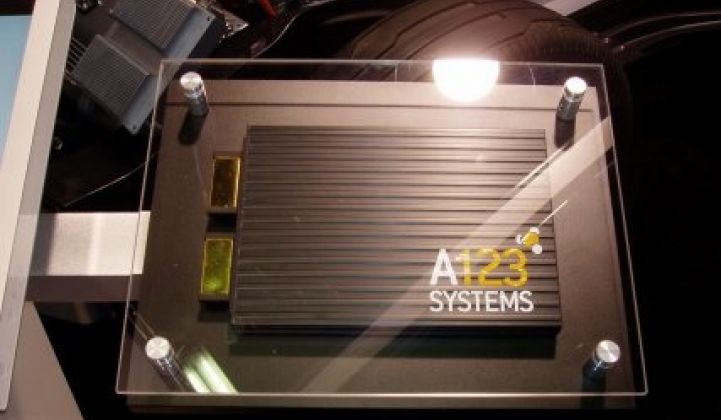A123 Systems has found a rescuer in the form of Chinese automotive technology giant Wanxiang, which has offered a $450 million investment that would give it majority control of the struggling U.S. lithium-ion battery maker.
A123 announced the news during its Wednesday quarterly conference call, and shares of the beleaguered Waltham, Mass.-based company were up slightly in morning trading as a result. Even so, A123’s shares have been languishing in the 50-cent range for the past few months, hobbled by the company’s ongoing struggle to stay solvent amidst a $67 million battery recall for its automotive customers.
The company has told investors it needs to raise cash to stay afloat, and only had enough cash for about 4 to 5 months of operation as of July. In May it announced a private offering of $50 million in senior unsecured convertible notes and warrants for institutional buyers, and in July announced plans to raise about $39 million in cash to shore up its finances.
The Wanxiang investment will include a bridge loan of up to $75 million and the purchase of $200 million A123 senior secured convertible notes and warrants, with the potential to purchase $175 million more at a future date. It’s expected to close by the end of the year, and the bridge loan should give A123 "sufficient capital to get through the next several months,” CFO David Prystash said. Forbes reports that the non-bridge loan portion of the investment would value A123 at 77 cents per share, a significant premium to its current trading price.
The news comes as A123 reported a second-quarter 2012 loss of $82.9 million, compared with a loss of $55.4 million in the same period last year. That comes on top of a $125 million loss in the first quarter, more than double the loss from the same quarter last year.
Given A123’s financial challenges, any rescue of this magnitude must be seen as a good thing compared to the alternative of insolvency. Wanxiang, which has $13 billion in revenues, has the kind of balance sheet that could reassure investors.
But a proposal to give a Chinese company effective control over A123 won’t sit well with its political backers or attackers. A123 received a $249 million Department of Energy grant and $100 million in state tax credits to build its its Livonia, Mich. facility, the same factory that produced the defective batteries now being recalled.
A123 has faced questions from U.S. Senators Chuck Grassley, R-Iowa, and John Thune, R-SD, as to whether it should continue to maintain access to its $249 million Department of Energy loan guarantee in the face of its recall and uncertain financial position. A123 has about $120 million left of the $249.1 million grant, and in April received a two-year extension on its deadline to spend the money.
A123 announced an important technological breakthrough in June that could lead to batteries that retain their charge at extreme temperatures without the need for expensive thermal management systems. But the company doesn't expect to see the technology enter volume production until mid-2013.
A123 lost $257.7 million in 2011, a 69-percent increase from losses in 2010. It held long-term debt of $161 million as of May, and its market capitalization as of Friday afternoon stood at $70 million, down from $170.68 million in July and a steep fall from its peak market cap of about $2.3 billion in 2010.
A123 customers include Fisker Automotive, General Motors, BMW, SAIC Motor Corp., Tata Motors and Smith Electric Vehicles, though the company didn't specify which were involved in the recall. A123’s battery defects did end up playing a role in problems for key customer Fisker, however, which has stopped work at its Delaware factory and faced problems meeting the terms of its own $529 million federal loan.
Transportation remains A123's most important line of business, although its grid storage business has been growing in the past year or so, with installations and orders that added up to 100 megawatts by the end of 2011, much of it in partnership with AES Energy Storage.
About a year ago, VC investor Vinod Khosla spoke to about 300 energy storage experts at the annual Energy Storage Association (ESA) meeting and predicted that A123 would not be around in ten years. He cited lithium's volatility and inherent safety issues. That news was less than satisfying for many in the audience (which included A123).



